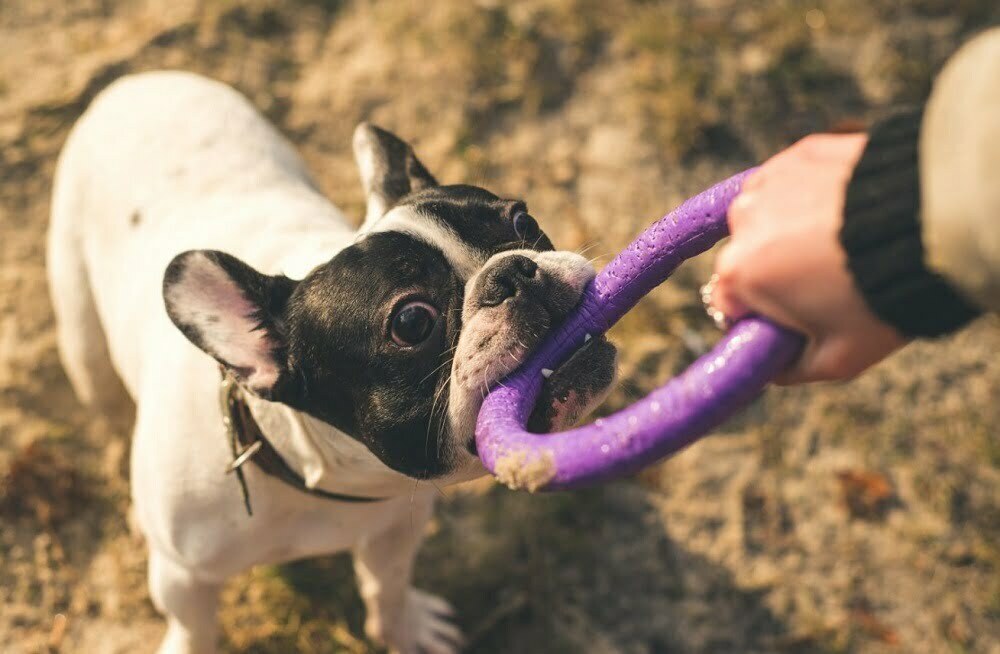French bulldogs, or “Frenchies” as they’re affectionately known, are one of the most popular breeds of dog, making a perfect companion for a wide variety of people.
They’re full of personality, relatively low-maintenance, and have a bright, playful energy that perfectly compliments their friendly, eager-to-impress nature.

So, if you’re thinking of adopting a Frenchie, or simply want to know a little bit more about the popular breed, then look no further.
This guide will take an in-depth look at the French bulldog, including all the essential information relating to their temperament, health, grooming, and much more. We’ll also take a look at the history of the breed, as well as a few interesting facts and some of the frequently asked questions.
Key Facts And Appearance
On average, French bulldogs have a lifespan of 10-12 years. This, of course, relies on them having a good quality of life, with a well-balanced diet and an appropriate amount of exercise.
If you’re looking for a dog to keep you super active, then the French bulldog probably isn’t for you. Frenchies are intolerant to a lot of exercise simply because of how their bodies are designed.
It can be difficult for them to breathe when they perform intense or excessive exercise due to the structure of their faces and the fact that they’re a brachycephalic breed of dog.
This also makes them prone to sunstroke and overheating as they’re unable to take in enough oxygen to keep them cool and refreshed.
Nevertheless, like most dogs, French bulldogs are prone to weight gain, so daily exercise and play remain essential. A short, leisurely walk around the block each day is usually sufficient for most Frenchies.
Daily walks also provide your dog with plenty of important stimulation from the outdoor sounds, sights, and smells.
In terms of their appearance, the oversized upward-pointing “bat ears” are the French bulldog’s most significant feature. Aside from their unique ears, Frenchies resemble their larger namesake, the bulldog, a great deal.
A wrinkly face and a short nose are framed by a large and almost square-shaped head. Furthermore, their small compact bodies are stocky, while their coats are short and smooth.
Frenchies come in a wide variety of hues. However, the most common coloring for this particular breed is white, brindle, and fawn.
For typical size and growth levels, the average french bulldog will stand between 11-13 inches tall. They also weigh, on average, under 28 pounds, with this being the same for both males and females.
Temperament
The French bulldog is a great companion dog and is considered an intelligent, well-tempered breed. They’re gentle, loving, and keen to please their owners, making for a fantastic pet.
While their nature can often be comical and mischievous at times, Frenchies are just as happy to spend their days lazing on the sofa. Just be mindful that they have a high level of alertness of their surroundings, so it’s unlikely that you’ll be able to get away with much under their watchful eye.
As mentioned above, the French bulldog’s personality is entertaining and endearing, so you’ll have plenty of smiles and laughs in their presence. They’re also relatively social and will fit easily into almost any living environment.
In terms of their temperament around other dogs and children, Frenchies can generally be trusted. Their demeanor around kids is excellent, so a French bulldog is a great option if you’re looking to get a dog for a young family.
It’s worth noting, however, that Frenchies can sometimes be territorial and possessive of their owners, especially when other dogs are nearby. This is why socialization is essential at an early age for this breed.
Health
There are a number of health issues that a French bulldog can typically suffer from. These are mainly due to the fact that Frenchies are a flat-faced or “brachycephalic” breed of dog, with the condition linked to several health problems, including significant breathing issues.
For example, Brachycephalic Obstructive Airway Syndrome (BOAS) means that brachycephalic breeds whose facial bones and tissues are compressed can suffer from obstructed breathing due to an elongated soft palate.
Dogs with brachycephalic syndrome are also unable to tolerate hot and humid temperatures or prolonged intense exercise. In some cases, surgery may even be required to improve airflow and breathing.
Furthermore, French bulldogs are susceptible to a host of digestive issues. They can become easily constipated and are well known for their excessive gas.
To help offset these problems, providing your Frenchie with a well-balanced diet of high-quality food is essential. So, try your best to avoid common store brands as they typically contain too much grain and corn which French bulldogs are allergic to.
In addition, these foods contain empty calories, especially since Frenchies have a tendency to be overweight. Instead, try to feed them grain-free food with plenty of lean protein sources.
Grooming
In terms of grooming, it’s recommended to brush your French bulldog once a week with either a hound glove or a soft bristle brush.
Unlike most other dogs, their short, fine, smooth coat is easy to groom and only sheds a minimal amount. Regular grooming helps to distribute oils on your Frenchie’s skin and promotes a shiny and healthy coat.
They’ll typically lose their undercoat twice a year, so during the spring and fall shedding seasons; it’s important to use a stripping comb and grooming mitt to remove the excess hair effectively.
Other essential grooming includes regular nail trimming, tooth brushing, ear cleaning, and wrinkle care. For the latter, the deep skin folds on your Frenchie may need to be cleaned every day. Just make sure that you wipe the crud from the wrinkles with a soft cloth or baby wipe and dry thoroughly afterward.
Trainability

French bulldogs are big personalities and avid people-pleasers, but training them can sometimes be a little challenging. They have a stubborn side, so it’s important to provide them with early puppy training to make them good and well-behaved companions.
Socializing and training your Frenchie from a young age will help it to learn good behavior and habits, and filter out anything problematic, ensuring they grow into a well-adjusted and well-mannered pooch.
The best way to train a French bulldog and make the whole process significantly easier is to give them proper motivation, such as treats, and make things more relaxed by creating a game out of their training.
They’re an intelligent breed, so they’ll react positively to a stimulating and positive training session where there are plenty of food rewards, praise, and play on offer.
If you’re struggling to make any inroads, try to remain positive and don’t punish your dog, as this will undo any of the progress that you’ve made. Just be patient, stand your ground, and don’t give in.
A useful piece of advice is to try teaching your Frenchie new behaviors on a leash – even when you’re inside. This way, your dog can’t wander off when they’re no longer interested and have had enough.
Furthermore, most smart dogs tend to become bored quickly, so it’s a good idea to break down the training into several smaller sessions lasting only a few minutes.
In terms of their potential to bite, Frenchies very rarely do so aggressively. In fact, the majority of adult French bulldogs don’t bite at all. Puppies may bite and nip as part of play and teething, but they generally grow out of this behavior.
Fear and aggression are normal in Frenchies; they typically reflect this with barking as their way of telling you to keep your distance. If you don’t heed this warning, they may progress to growling, and if you still continue to approach and invade their space, a bite is often the next natural step.
This, however, is incredibly rare and will never happen if you treat your Frenchie with respect and listen to their warning signs if they’re feeling scared or uncomfortable about a certain situation.
History
Despite the name of the breed, the French bulldog is actually English in origin. In the 19th century, the bulldog became an increasingly popular companion dog, with toy bulldogs often a mascot for lacemakers across England.
However, many in the lace trade soon moved over to northern France for improved opportunities, and when the entire industry eventually migrated to France, so did all their dogs.
The French immediately took to these toy bulldogs and soon mixed them with other breeds, such as terriers and pugs. It was this breeding that further exaggerated the distinctive, oversized bat-eared look which the people of France were particularly fond of.
While their popularity quickly spread across France with the new name, “Boule-Dogue Francais” (French bulldog), it was slow to catch on in England.
This was a reflection of the national rivalry between the two countries, with England outraged at the naming of the dog. After all, the original bulldog was considered a national symbol of England.
Frenchies continued to prove fashionable in Paris, where they were a pivotal part of the “cafe society” throughout the early-to-mid 1900s. They were also depicted in paintings by celebrated French artists such as Edgar Degas and Henri de Toulouse-Lautrec.
In modern times, the French bulldog has become a popular companion for a host of celebrities. To name a few: David Beckham, Madonna, John Legend, and Reese Witherspoon.
Cost
The price of owning a French bulldog isn’t cheap. On average, the cost ranges from $1,400 to $8,000, with factors such as the breeder, color, and pedigree of the dog all having an influence on the final price.
But why are Frenchies so expensive? It’s mainly due to the fact that, in most cases, they need to be artificially inseminated. Furthermore, most French bulldog females must also have C-sections because of the risks associated with natural births.
All of these costs add up and are therefore passed on to the consumer, resulting in a considerably higher purchase price for the dog.
Adoption vs. Finding A Breeder

Deciding whether to adopt or go through a breeder for your new French bulldog is a difficult decision that often boils down to personal choice.
Thorough research is required, and thankfully there are many resources available to help you find a rescue or breeder that can offer healthy and ethically sourced French bulldog puppies.
According to the American Kennel Club, adopting a French bulldog puppy is less complicated than many people think, with breed rescues reporting that the majority of their rescue dogs come from individual owner surrender.
This is usually because of the owner having a change of lifestyle or the breed not being quite right for them.
The main point of difference between a rescue and a breeder is that a rescue may not always have young puppies to choose from. On the flip side, most rescues only adopt dogs that have been microchipped and spayed/neutered.
This is considerably easier as an owner, as it means that the Frenchie you end up with may well have already been housebroken and doesn’t need these common medical procedures.
If you’re set on going through a breeder, just be mindful that many puppy mills out there pose as reputable breeders. Be aware of scams like these, and use a range of online forums for advice.
Furthermore, don’t be afraid to ask plenty of questions or make arrangements to meet the parent dogs. If something seems wrong at a breeder you visit, it’s likely that there’s something untoward going on.
Fun & Surprising Facts
- French Bulldogs are fashionistas with reputable clothing lines, celebrity owners, and huge Instagram followings
- According to the American Kennel Club, the French bulldog is the sixth most popular dog breed
- The majority of Frenchies fart a lot as a result of their sensitive stomachs and their inability to digest food efficiently
- A French bulldog was onboard the Titanic (unfortunately, the 2-year-old didn’t survive)
- Frenchies are terrible flyers, so if you have to take your pooch on a flight, be sure to discuss preventative measures with your vet
Frequently Asked Questions
Can French Bulldogs Swim?
Although many assume that all dogs love being around and playing in water, it’s best to keep your French bulldog away from tubs, pools, and other bodies of water. This is because of their top-heavy bodies and short-snout respiratory issues, making it almost impossible for them to swim.
Do French Bulldogs Bark?
While French Bulldogs aren’t typically considered a breed that barks a lot, there will always be an exception to the rule if they’re placed in a particularly scary or intimidating situation. As mentioned earlier, Frenchies are relatively simple to train if done correctly, so they can be taught not to voice (bark) an opinion unless encouraged to.
How Many Hours A Day Do French Bulldogs Sleep For?
Puppies of this breed typically sleep most of the day away as they need the energy to grow and develop properly. However, once they’ve grown up and progressed into adulthood, Frenchies tend to sleep for anything between 12-14 hours a day. In their older years, they might also need to sleep for a little longer.
Do Frenchies Like To Cuddle?
Yes, French bulldogs are very cuddly dogs. They’ve been bred to be a human companion, so as their owner, they see you as their pack leader. Therefore, they’ll constantly crave the feelings of love and security they get from being cuddled up close to you.
Do French Bulldogs Get On With Cats And Other Pets?
Frenchies are a social breed by nature and get on with cats and pets that they already know. There may be a small adjustment period at the start, but this is to be expected with all breeds of dogs. French bulldogs are generally good around other dogs too.
Are French Bulldogs Aggressive?
While French bulldogs are social, they’re often described as “big” dogs in a small dog’s body and have the attitude to prove it. Despite this attitude, a well-handled Frenchie would rarely show any sort of aggressive behavior towards either people they know or strangers they’ve never met before. This explains why French bulldogs are such a popular choice for young families.
